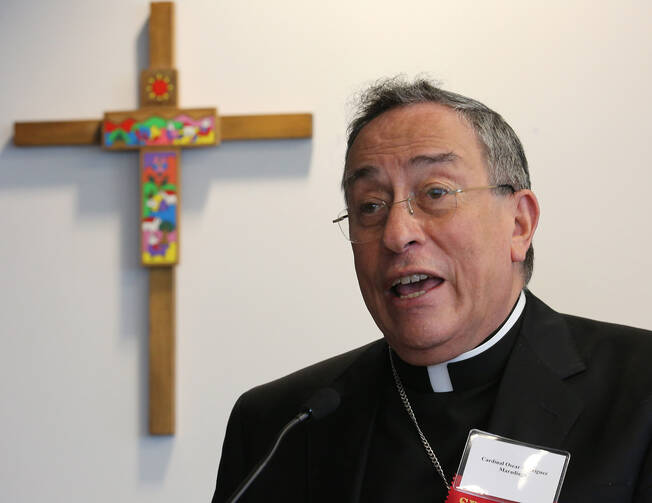Last night at the Mission Church of Santa Clara University in Santa Clara, California, Cardinal Oscar Andres Rodriguez Maradiaga, Archbishop of Tegucigalpa, Honduras, President of Caritas Internationalis, and Head of the Pope’s Council of Cardinals (the so-called “Gang of Nine”) presented a major lecture on “The Meaning of Mercy.”
Responding to Pope Francis’ frequent call that at the heart of Christianity lies the call to show mercy, Rodriguez proposed that Catholics should imagine the church as “a Samaritan Church,” an institution which like the Good Samaritan chooses to “heal the wounds of those who are beaten, hurting and prostrated, those who have weakly fallen under the power of those who use violence.”
Such a concept, he argued, returns the church to its earliest foundations as “a Church that is close to people, incarnated and submerged in the existential history of man, turning their miseries into wealth and their weaknesses into their biggest strength.”
“The Church,” he said later, “is not here to judge, to condemn, to reproach or to reject anybody, but to embrace as in a home where love reigns for everyone who needs it. Following Jesus does not mean to participate in a triumphant entourage. It means to share his merciful love.”
In an intriguing take on Vatican II, Rodriguez proposed that the Council developed the externals of church like liturgy, lay participation, ecclesial structure—"institutional and functional changes.” But alone these changes “proved insufficient, superficial. Sometimes they created new problems and crises both unnecessary and deep,” even a “’schizophrenia’ in some Christians.”
By focusing on mercy, Rodriguez argued that today the church is entering into that “deep and global renovation” that it previously missed, a renovation of its fundamental motivations—“the ‘why’ of its organization and its action.” Pope Francis’ goal, he said, is to help this along “to the point where it becomes irreversible.”
The church, he suggested in a quote from Pope Francis, finds its fullest realization as a mother: “the joy of the Church is to give birth; the joy of the Church is to go out of herself to give life.” “Even if she is well organized, has a perfect organizational chart, everything’s fine, everything’s tidy," he went on, "But she lacks joy, she lacks peace, she becomes a disheartened Church, anxious, sad, a Church that seems more like a spinster than a mother, and this Church doesn’t work, it is a Church in a museum.”
In his wide ranging remarks, Rodriguez described the fall’s Synod on the Family as having been “like two Synods”—the “media Synod” outside the precinct, which showed a “perverse intention to confuse opinions, invent answers, imagine solutions and exaggerate positions of those of us gathered there;” and the meeting of the bishops, where “a charismatic, serene, cordial, filled-with-unction-and-faith synod was taking place.”
On the specifics of the Synod’s discussion on divorced and remarried Catholics, Rodriguez insisted that the question of the reception of Communion was “never essential.” The heart of the bishops’ conversation was instead about the feeling that no one wants “the realities of divorced and rebuilt families” to be “an impediment to live and participate in the abundant life of the Church; that the ‘sacramental communion’ is not the only way to vitally participate in the pastoral dynamic of the parish community.”
Quoting again the Pope, Rodriguez got a big laugh when he reminded the full house that we must be “careful not to turn the parish and episcopal offices into ‘customs’...’We are many times ‘controllers of faith’, instead of becoming ‘facilitators’.’”
A similar reaction ensued when the cardinal ventured from his prepared text to mention the Pope’s Christmas comments to the Curia. “It is good to refer to the last speech of the pope to the Roman Curia when he was denouncing some illnesses. Not only to the Curia, but also for each and every one of us....To have good health spiritually it is necessary to make a very good examination of conscience regarding I would say these defects we can have, or maybe sins.”
Prior to the evening talk Cardinal Rodriguez spent the day in San Jose speaking at various meetings with local clergy, a group of immigrant mothers and with Santa Clara students, whom he not only took questions from, but played piano for and then directed in song. The cardinal is a classically trained pianist and jazz saxophonist.
Much like Pope Francis, the cardinal showed throughout the day a remarkable freshness of spirit and thought. After his talk he spent an hour sitting before the gathered hundreds in a simple black suit, gentle and open in tone, a smile never far from his face.
Some of his most provocative comments, particularly with regard to the place of homosexuality in the church, but also capitalism, the plight of youth in Latin America and martyrdom came out in these post-talk interchanges. I’ll be posting transcripts of those moments over the next few days as text becomes available, along with links within this article.
The full transcript of the talk, along with podcast and video versions, will be made available on Santa Clara’s Markkula Center for Applied Ethics website.
Transcripts
Cardinal Rodriguez Maradiaga on the Situation in Latin America
Cardinal Rodriguez on the “Unfree Market”
Cardinal Rodriguez on Homosexuality and the Church








